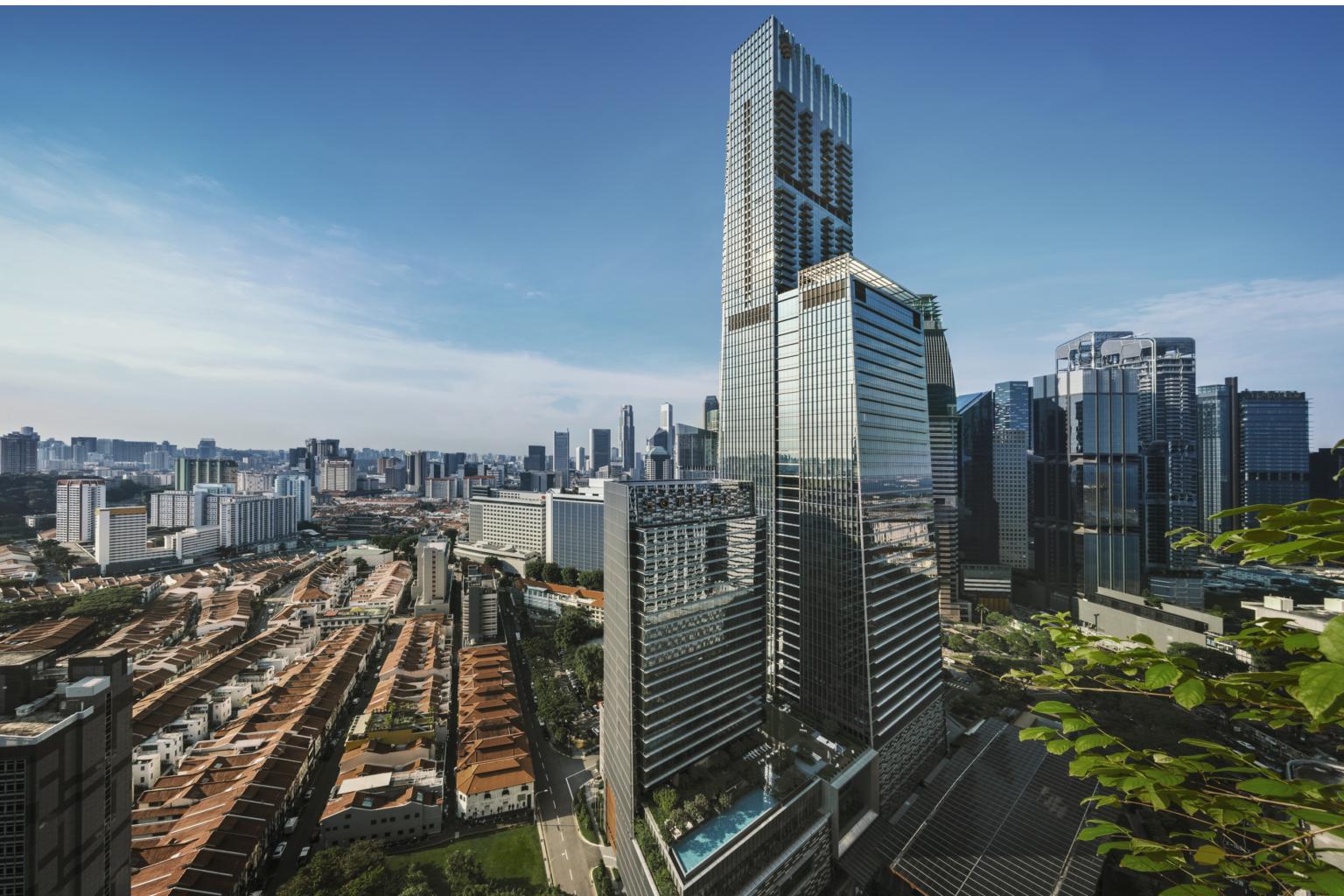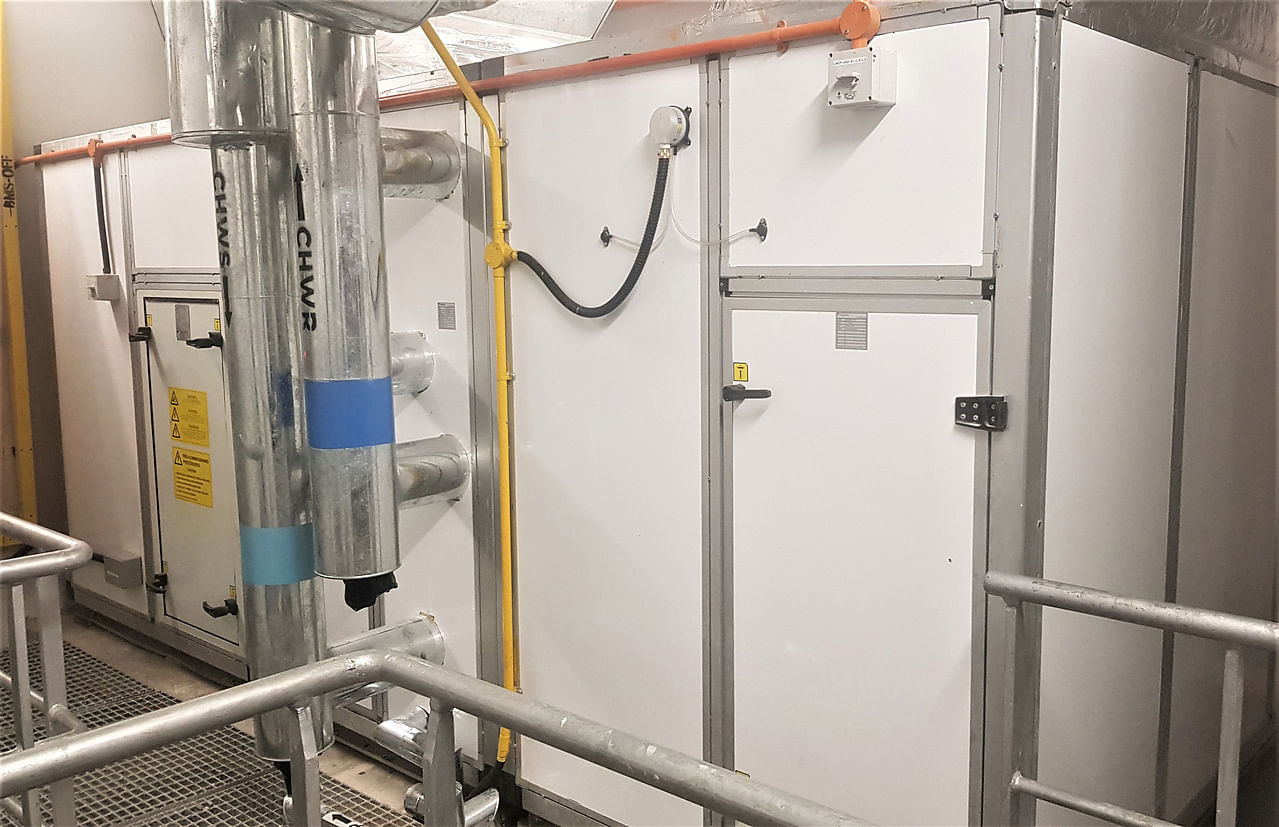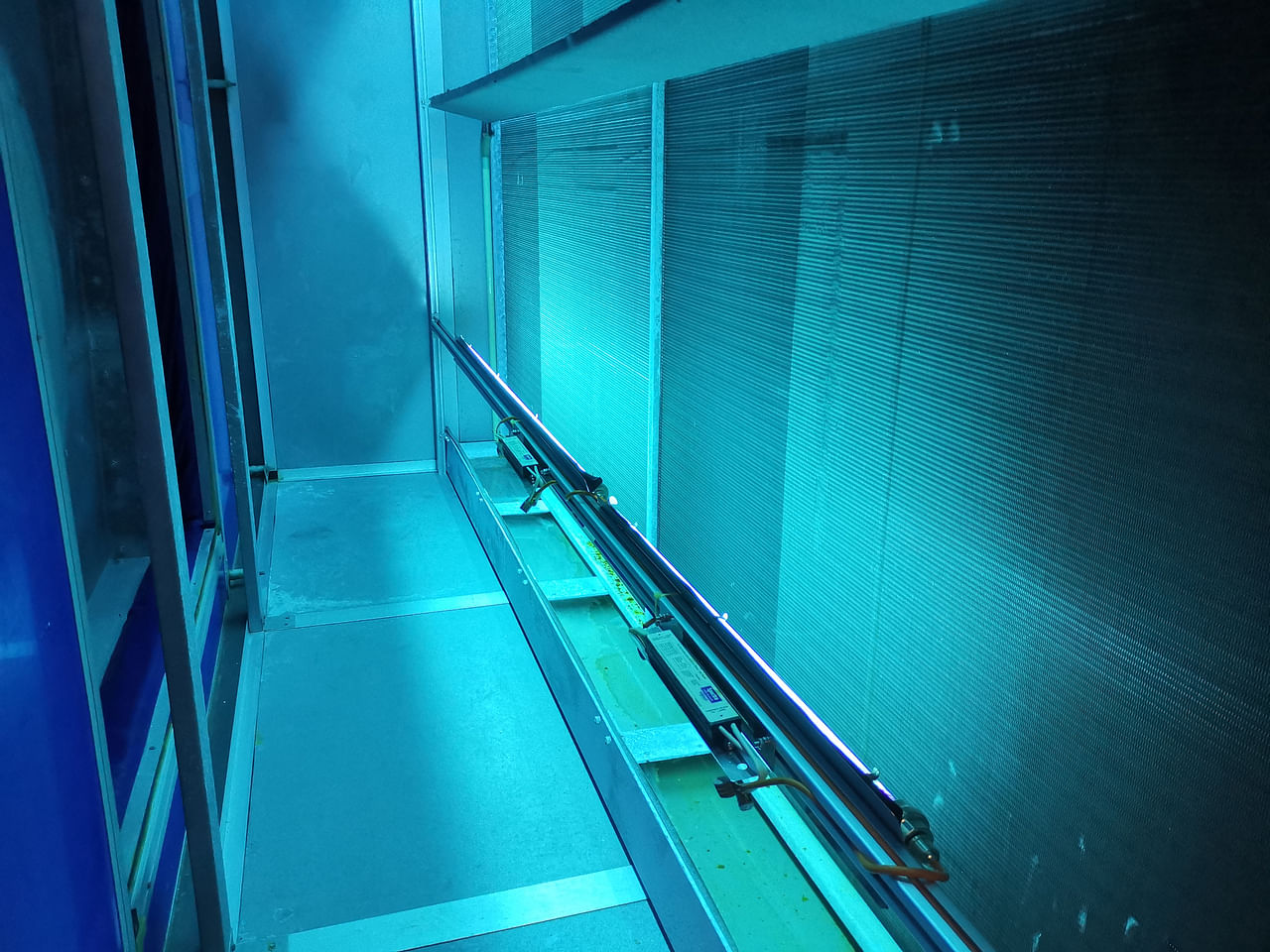Creating biosafe havens at the office: How some businesses here do it
Sign up now: Get ST's newsletters delivered to your inbox

Guoco Tower’s full glass facade allows more sunlight to reach inside the building.
PHOTO: COSENTINO
Follow topic:
SINGAPORE - Mr Alan Teo, director of cleanroom technology company Airtech Singapore, has been washing his hands assiduously 15 to 20 times a day since 1984.
"I'm a serial hand-washer," shares Mr Teo, 57, an engineer whose company has been building complex cleanroom environments for governments, private sector multinational clients as well as hospitals in South-east Asia for more than three decades.
He recommends that everyone does the same too. His advice comes as a wake-up call for those who think the pandemic may finally be under control with the global easing of tough lockdown measures.
The World Health Organisation's emergencies expert, Dr Mike Ryan, warned on Wednesday that the coronavirus that causes Covid-19 could become an endemic virus like HIV. Even if a vaccine is developed, it "may never go away".
From ultraviolet light to antibacterial architectural materials, businesses now have a veritable arsenal of high-tech weaponry at their disposal to stay fighting fit in what looks to be a long, drawn-out battle with the coronavirus.
Mr Teo believes the new normal at work will take a leaf from the cleanroom model's book.
"Biosafety, which ensures harmful bacteria and viruses are eliminated in workspaces, will be the watchword going forward," says Mr Teo, who leads Airtech's team of specialists who ensure laboratory-quality standards of hygiene in the company's cleanroom projects in Malaysia, Thailand, Myanmar, Indonesia, the Philippines and Hong Kong.
Simple soap and water are the first line of defence against pathogens such as Sars-CoV-2, which causes Covid-19, he says.
Although it is not practical to replicate isolation conditions to the letter, Mr Teo says businesses have to add second and third lines of defence by making sure the air in the office is free of pathogens and surfaces are non-porous so as to inhibit bacterial growth.
"When you see colonies of bacteria multiplying under the microscope, you tend to develop zero-tolerance for pathogens either on surfaces or which are airborne, and you're always on your guard," says Mr Teo, who even wipes grocery items with a disinfectant and is extra careful of supermarket plastic carrier bags. "You have to fold them downwards and not touch the exteriors."
"Most offices with air-conditioning have recycled air," says Mr Teo. "Air needs to be cleaned with UV light and there should be a proper system of vents that allows for a constant supply of fresh air so there is less stale air circulating in the workplace."
REDUCING TOUCH POINTS, LETTING THE SUN IN
Virus colonies that inhabit droplets or which are tinier and airborne when infected people sneeze or speak do not stand a chance of survival in Guoco Tower in Tanjong Pagar.

csclean16 - AHU Copyright: GUOCOLAND
PHOTO: GUOCOLAND
Singapore property developer Guocoland has been focused since Guoco Tower's opening in 2016 on not only improving indoor air quality, but also on tinier details such as reducing touch points in elevators through contactless, sensor-activated controls.
The company's flagship integrated development is also Singapore's tallest building at 290m.
Guoco Tower has been awarded two of the highest certifications in the building industry: the Green Mark Platinum award by the Building and Construction Authority (BCA) and the Leadership in Energy and Environment Design (Leed) Platinum certification by the American Green Building Council. It is one of a few buildings in Singapore to have achieved these rigorous standards.
But what probably stands out in Guoco Tower is its state-of-the-art HVAC (heating, ventilation and air-conditioning) systems, which keep the indoor environment not only comfortably cool, but also healthy because of the attention paid to air quality.
To prevent cross-contamination, two standalone air handling units (AHUs) are provided for each floor of the offices in Guoco Tower. There are 64 AHUs in total, which cool down humid air to 12 deg C, which then condensate at the cooling coil, before fresh, dry and cold air is pumped back into the office spaces.
With all the AHUs running at full capacity, the system can fully circulate the air in the 31 floors of office space about five times an hour. This air circulation process purifies the air while ensuring that stale air is pumped out.
There are also separate exhaust systems for the washrooms to further guard against contamination.
Any lingering microbes or bacteria in the treated air are zapped in a process called ultraviolet germicidal irradiation (UVGI), which kills 90 per cent of airborne pathogens. While there are other air cleaning technologies, using ultraviolet light to kill viruses is one of the most effective technologies for commercial spaces.
"The state-of-the-art equipment we use at Guoco Tower, including the high-performance air filters and the UVGI system added to the AHUs, are some of the best available," says Ms Valerie Wong, general manager, asset management, in Guocoland.

csclean16 - UVGI Copyright: GUOCOLAND
PHOTO: GUOCOLAND
"The HVAC systems at Guoco Tower also allow us to monitor the level of carbon dioxide in the offices as the system feeds more fresh air to maintain it to below 800ppm (parts per million)," says Ms Wong.
Furthermore, Guoco Tower's full glass facade allows more sunlight into the building. This helps kill germs. To control the amount of solar heat, Guoco Tower has high performance glazing units with three layers of glass, which reduce its cooling requirements by 20 per cent.
"To be really future-proof, our responsibility as developers is to ensure our office buildings not only offer best-in-class building services systems, but also have the capacity for future upgrading," says Ms Wong.
ANTIBACTERIAL SURFACES FOR BUILDINGS
One of the world's top architectural materials suppliers, Spanish company Cosentino has since 2013 created architectural surfaces with antimicrobial and antibacterial properties, plugging a gap in the market for such high-tech materials that can be used in a wide range of applications indoors as well as outdoors.
Cosentino distributes its high- tech treated architectural materials in more than 100 countries and has eight manufacturing plants, seven in Spain and one in Brazil.
A patented process shortens the metamorphic changes that natural stone undergoes, from exposure to high pressure and high temperatures for thousands of years to just a few hours.

The ultra-compaction process, known as "particle sintering technology", combines advanced processes from the ceramic, flat glass and quartz surfaces industries to produce a new material that has almost zero porosity or microflaws. Dekton is made up of a mixture of 20 different natural raw materials.
This lack of porosity inhibits bacteria from festering in grooves and crevices and is perfect for office desktops and conference tables.
The hardy antibacterial material can also be used for flooring, stairs, cladding and outdoor facades.

